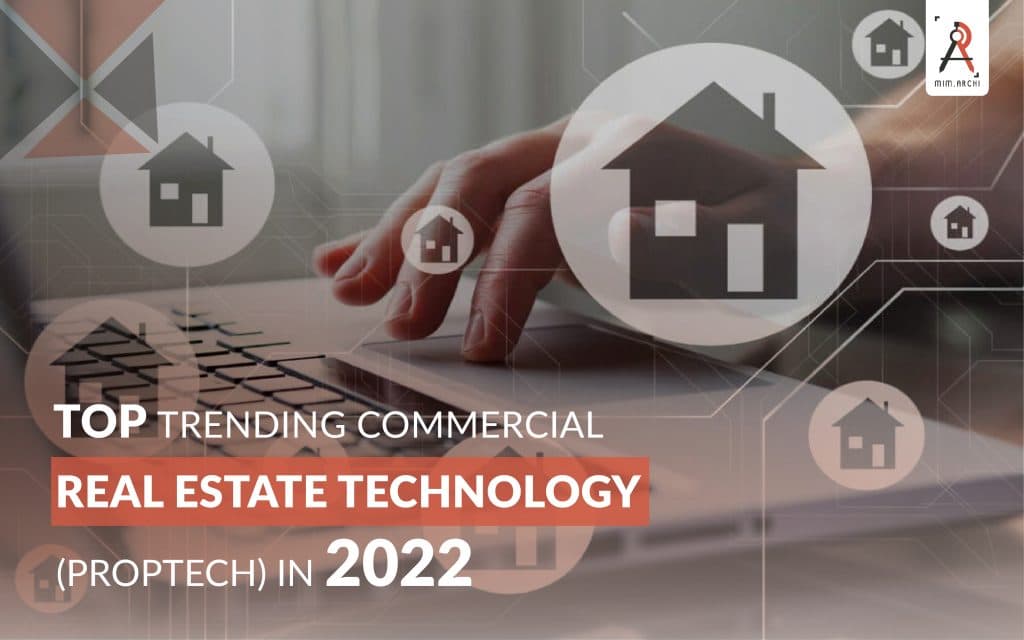
Top trending commercial real estate technology (Proptech) in 2022
Home » Blog » Real Estate Tech » Top trending commercial real estate technology (Proptech) in 2022
Commercial real estate technology enables real estate firms to work more efficiently. According to a report by IBISWorld, commercial real estate is worth $4 trillion. It is all due to the new technologies driving growth and increasing efficiency. Investors and individuals alike are benefiting from this transformation.
Technological advancements bring efficiency which results in fast and more accurate growth. But in the last 4 to 5 years Proptech industry adopted technology in a speedy way. However, real estate remained behind when it came to technology. New software and tools brought advancement to commercial real estate technology. This also led to competition as Proptech companies are rapidly adopting these advancements.
In light of the above factors, interest will increase in brokerage services, valuation, sales, consulting, and appraisals. Find out more about commercial real estate technology and how this cutting-edge technology is transforming the industry.
What is real estate technology (Proptech)?
The term residential and commercial real estate technology (Proptech) is used to describe the type of software that is used to bring efficiency to the industry. There are tools and platforms that facilitate the management of deals, portfolios, and more. A Proptech company connects people with information to simplify the process of buying, renting, and investing in real estate.
What is the difference between Proptech and fintech?
There are many ways in which Proptech is similar to fintech (financial technology). But to be true both have different applications and uses.
• Fintech:
Fintech is majorly used by the financial sector in payment processing, lending, and banking.
• Proptech:
Proptech is disrupting traditional spreadsheet-based processes. Instead, it is replacing them with tools that boost efficiency.
Residential and commercial real estate technology is similar to but distinct from construction technology (Contech). Contech pertains more to the construction process itself
What is commercial real estate technology?
Commercial real estate technology increases access to information and empowers professionals to make data-driven decisions more efficiently and quickly, resulting in higher revenue. The real estate technology serves both business-to-business (B2B) and business-to-consumer (B2C) companies. Here are some of the best tools used for different purposes in commercial real estate.
Commercial Property software
• Commercial Projects:
– ProCore
– BuildingConnected
• Customer Relation Management (CRM)
– Ascendix
– REthink
– ClientLook
– Apto
• Investment Management
– IMS
– Juniper Square
– Dealpath
• Marketing
– Sharplaunch
– Matterport
– Property Capsule
• Property Management
– Angus Systems
– Aquicore
– Building Engines
– Buildium
– PropertyMatrix
– AppFolio
– MRI software
• Research and Analytics
– Cherre
– CompStack
– Real Capital Analytics
– Salt.io
– REIS
– Reonomy
– Realstax
– Datex
– ProspectNow
– REscour
Commercial Real Estate Technology Is Driving the Industry
Decision-makers are beginning to recognize the advantages of connectivity, seamless collaboration, and centralized data. Commercial real estate technology is growing in popularity as the market size increases. Statistics from Statista indicate that commercial real estate technology raised $18 billion in funding in 2018.
Eventually, property technology companies will develop innovative technologies to make transactions seamless in a connected future.
The Proptech revolution has already spurred growth for small investment teams. Previously, these small teams used traditional methods to analyze data and communicate with clients. In the meantime, they are working on improving their processes to increase their scalability. It is all due to commercial property technology that allows them to work together and make better decisions.
Additionally, this allows the process to be easy and efficient, leading to an increase in real-world transactions. However, the most exciting part is the data, that shows past performance as well as future potential
Commercial real estate technology based on data and analytics
Commercial real estate technology offers many benefits, which is a scalable way of leveraging firms’ data. Historically, reports and data-driven insights have been cumbersome and, sometimes, unreliable. However, they provide important information for strategy development. Data analytics is helping real estate decision-makers solve real-world problems with commercial real estate technology.
This function isn’t available on all tools. Dynamically sourced data can be cultivated programmatically into analytics with the right property management software. When your investment criteria are misaligned, the crappy deals can provide useful benchmarking information for future deals. Analytics tools provide insights faster and without the effort of digging through unstandardized spreadsheets.
Commercial real estate technology is advancing rapidly, and data is becoming a vital tool for investors looking to stay competitive.
Commercial real estate and VR
Realtors and brokers are likely to be attracted to virtual reality for a variety of reasons. In a similar manner, the internet has allowed potential buyers and renters to see properties instantly. Using virtual reality, the buyer can step inside the home. Within seconds, the buyer can view another property, see how it would be like to live there, and then decide if it’s a suitable fit.
Virtual reality is on hold for the time being, due to the cost and expert knowledge required. These costs will decrease as virtual reality becomes more common.
In addition, virtual reality is also used for touring construction sites. 3D models can be used to mock up interiors of planned buildings for investors, buyers, and tenants to see before they purchase. It is currently too expensive to use this technology in most cases, but over time it should become more affordable.
Commercial real estate and AR
AR will play an increasingly significant role in real estate. Using 3D modeling software, companies are able to design finished spaces that include furnishings and other customization features. Renters and other potential tenants can visualize their own lives in space. A simple drag-and-drop tool exists, but most realtors can’t afford detailed renderings.
In addition to AR’s ability to populate a building’s “shadow image,” it also helps to pack detailed information into it. The benefits of IoT energy management, such as the HVAC system’s green value and cost savings, may go unnoticed by tenants, but they could tip the balance in favor of a building. Moreover, augmented reality provides detailed information regarding how these features affect a tenant.
Read Now: 6 best ways to sell your real estate!
In my opinion
Technology can reduce the personal touch in business transactions, which is one of its unintended side effects. Even the most sophisticated technologies cannot deliver what people want: Face-to-face contact in commercial real estate transactions. We provide a personal touch to all our customers – owners, brokers, and tenants. Further, nothing can simulate authentic interactions better than the most cutting-edge technologies.

